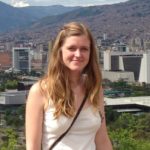Language-Based Area Studies
Language-Based Area Studies
The Language-Based Area Studies Pathway is offered at both Durham and Newcastle.
Language-Based Area Studies (LBAS) pathway statement: Arab studies, Asian Studies, Iberian-American Studies
The Language-Based Area Studies (LBAS) Pathway is offered at Durham and Newcastle Universities and includes three strands in Arab Studies, Asian Studies, and Iberian-American Studies.
The Language-Based Area Studies (LBAS) Pathway is offered at Durham University via the School of Government & International Affairs (Institute for Middle Eastern and Islamic Studies) in collaboration with the School of Modern Languages and Cultures, which delivers Arabic language training; and at Newcastle University via the School of Modern Languages (East Asian Studies section; Spanish, Portuguese and Latin American Studies section).
Across the two institutions, students following the Language-Based Area Studies (LBAS) Pathway engage with research that is conceptually rooted, theoretically innovative and empirically rigorous. In each institution, our research has research-user impacts, and we have significant global academic impact as well.
Inter-disciplinarity
The Language-Based Area Studies (LBAS) pathway is inherently inter-disciplinary, and both previous and current studentships have involved interactions and cross-fertilisations between distinct social science disciplines as well as between the social sciences and the humanities.
In the Arab Studies strand, our students to date have been guided by inter-disciplinary teams of supervisors hailing from Middle Eastern political science, political economy, international relations and Muslim political thought.
In the Asian Studies strand, our students to date have been guided by inter-disciplinary teams of supervisors hailing from Chinese area studies, social anthropology, political science, political geography, media studies, sociology and law.
In the Iberian-American Studies strand, our students to date have been guided by inter-disciplinary teams of supervisors hailing from Spanish, Portuguese and Latin American area studies, politics, sociology and geography.


Thematic areas
In the Arab studies strand, we offer expertise in the following thematic areas: Arab, Israeli, Turkish and Iranian politics; Middle Eastern and North African international relations; regional security studies; the politics of identity, ethnicity, religion and diaspora; youth and youth policy; social movements and the politics of resistance; political Islam and Islamist political thought; gender and society; and regional political economy.
In the Asian Studies strand, we offer expertise in the following thematic areas: identities; ethnicity, nationalism and borders; inter-ethnic relations; social protest and resistance; Uyghur / Xinjiang studies; Islamic revivalism; critical security studies; critical terrorism studies (including state terrorism); genocide studies; diaspora studies; transnational film studies; independent documentary film-making; audience/reception studies; language rights and language policy; gender and sexuality studies; transmediality; media representation studies; popular culture studies; world politics (including environmental politics); modernity studies; cross-cultural studies; built heritage, urban conservation, and sustainable urban development; and geospatial technology and urban governance.
In the Iberian-American Studies strand, we offer expertise in the following thematic areas: popular culture studies; nation, nationalism and state formation; conflict and conflict resolution; climate crisis and the Amazon; climate activism; gender relations and sexual diversity; indigenous knowledge and decolonial thought; popular education; race, ethnicity and religion; politics of everyday life; inequality; language ideologies; youth cultures; social movements; participatory democracy; urban studies; and sustainable development.
Across the three strands, we have supervised students using a wide range of methods, both qualitative and quantitative, including ethnography, interviews and focus groups, observation, and textual and discourse analysis. We anticipate that students may when appropriate spend significant periods of time in the field.
Please consult the respective webpages for each strand to find out more about our scholars’ specific areas of expertise in Language-Based Area Studies. Bear in mind, however, that our supervisory teams often also include people working in other departments and Schools within the universities:
Institute for Middle Eastern and Islamic Studies at Durham University
East Asian Studies at Newcastle University
Spanish, Portuguese and Latin American Studies at Newcastle University
Research Environment
Both institutions are engaged in a variety of exciting activities linked to research, and are committed to promoting engagement and impact beyond the academy. We therefore offer a rich research environment in which our PhD students can thrive. Durham University hosts the Institute for Middle Eastern and Islamic Studies, while Newcastle University hosts the Asian Studies Research Group and the Centre for Latin American and Caribbean Studies. Newcastle is also home to the Chinese Independent Film Archive (CIFA), which holds a large and rare collection of films and footage, their associated material culture, publications on Chinese independent cinema in English and Chinese, and oral history material.
Research Training
At both institutions, opportunities exist for PhD research training across a wide range of social science disciplines, also in tandem with humanities disciplines, where required and optimal to achieve research aims and objectives.
Candidates wishing to do a 1+3 course at Newcastle can first do an ESRC-recognised MA in a related subject that will prepare them for their doctoral research, for instance:
Students already holding a recognised research training qualification at MA level in an appropriate discipline, or those with equivalent Masters-level research training, are eligible to apply for LBAS funding at Newcastle on a +3 or +3.5 basis. For these applicants, further, consolidatory research training is available and is undertaken during the first year, in conjunction with their primary research on their PhD topic.
Candidates wishing to do a 2+3 course at Durham may initially register for the two-year MSc in Arab World Studies, which offers a combination of intensive Arabic language training, wide-ranging research methods training and some subject-specific modules relating to the politics and international relations of the Middle East:
For those students with either sufficient prior research training or language skills, a reduced programme of study may also be possible at Durham.
On completion of their MA or MSc, students awarded 1+3 or 2+3 funding will proceed to their PhD studies at the same institution.
Enquiries
If you are interested in submitting an application to any of the three strands of the Language-Based Area Studies (LBAS) Pathway, please contact the named person below for the strand that you’re interested in joining:
Arab Studies:
Professor Emma Murphy (Institute for Middle Eastern and Islamic Studies, Durham University): [email protected]
Asian Studies:
Dr Joanne Smith Finley (East Asian Studies section, School of Modern Languages, Newcastle University): [email protected]
Iberian-American Studies:
Dr Nick Morgan (Spanish, Portuguese and Latin American Studies, School of Modern Languages, Newcastle University): [email protected]









